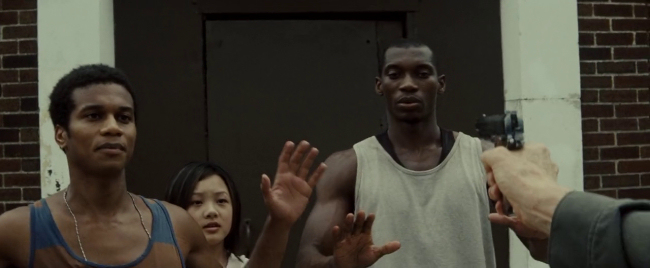
I'm used to finding films directed by Clint Eastwood to be overrated but this didn't prepare me for how intensely bad his 2008 film Gran Torino is. It goes to show how much tenure buys you in Hollywood--I try to imagine pitching to a studio a movie where I play a war veteran white guy in a neighbourhood of Hmong refugees, where I constantly insult everyone and then I'm hailed as a hero by the legion of two dimensional characters who heap tributes on my doorstep and I also teach one of the Hmong how to be a man and the movie ends with my Christ-like sacrifice and a song sung by myself even though I can't sing. I think, if the studio rep was kind, he or she would tell me I was in the wrong place and point me to where I might find someone who'd jerk me off for money.
The film begins promisingly enough; Walt (Eastwood) is at his wife's funeral and growls at his granddaughter (Dreama Walker) wearing a crop top and a flashy belly button ring. I've seen this kind of thing--people seem to've forgotten how to dress and act respectfully at funerals. Her brother and Walt's son are also disrespectful but the focus remains on the young woman who ends up poking around Walt's garage where he, a tall dark figure, corners her while she crassly asks him to leave her his car, his Gran Torino, when he dies.

The predatory misogynist undertones to the scene are hard to miss. She throws down her cigarette and he steps angrily into her personal space to stamp it out. She maintains complete, improbable, comfortable insensitivity, which makes her behaviour at the end of the film, the next time we see her, bizarre except in consideration of the fact that the purpose of the film is to exalt Eastwood's character.

Walt's a veteran of the Korean War and considers hurling constant racial slurs at everyone just a normal way of talking. I have no doubt there are older folks who don't see anything wrong with constantly calling Asians "zipperheads" and their Italian barber a "Dago-wop" but even Jerri Blank had more discretion than Walt.
Well, maybe not. Still, despite Strangers with Candy being an absurdist comedy, the world it portrays is still more realistic than the one in Gran Torino where Walt pulling a shotgun on some Hmong gangsters who'd stepped on his lawn gets him rewarded by the entire neighbourhood just because he managed to save Thao (Bee Vang), the teenage neighbour boy, in the process. So the next day, everyone in the impoverished neighbourhood starts loading flowers and food on his porch.

In case you're wondering whether or not this is really Hmong custom, the answer, according to several pages that came up when I googled--articles and forums--is no. No, the Hmong don't start piling tributes on the doorway of a neighbour who did a nice thing. This is just one of many inaccuracies in the film, though, things I kind of sensed were inaccurate even though I know little about the Hmong, mostly because they resembled the behaviours of "Native" cultures in old films. They adore Walt now despite his constant verbal abuse because he's the White Saviour.

And he does plenty of saving, especially for a movie directed by a guy who's said in interviews how much he hates superhero films. Thao's sister, Sue (Abney Her), is wandering around the neighbourhood with her ridiculous white gangster poseur date (Scott Eastwood) when they walk stiffly and awkwardly into a frame where three black gang bangers are standing. They humiliate Sue's date then start pushing her around before Walt shows up in his white pick-up truck and threatens them all with a gun.

The firepower in the hands of anyone at any time always miraculously favours Walt's goals. Later in the film, he kicks the shit out of one of the Hmong gangsters and the Hmong gang retaliate with a drive by shooting of . . . Walt's neighbour's house.

After he saves Sue from assault, she gives him a brief book report on Hmong culture. Good on Eastwood for actually casting Hmong actors, I guess, but maybe he'd have been better off just going with any Asian actors who didn't talk like Siri. I hear Eastwood chose not to give direction to his actors and, wow, it sure shows. Sue likes to stick with Walt after this and in her flat, mashed together line deliveries she becomes his friendly robotic tour guide of the film's version of Hmong culture. Naturally, she never once suggests he avoid flinging the verbal abuse at herself or her family.

His attention moves from Sue to Thao as he teaches the kid to be a real man. By the end, everyone is in awe of the wisdom inherent in Walt's crustiness. The movie is so transparent it is actually pretty hilarious.
Twitter Sonnet #935
The washing troop announced by tapping twice.
In slush the frozen eyeless men reside.
A note of sorts was writ upon the ice.
The hair betrays a shifting form outside.
Through narrow pipes of bark the trees exhaust.
A wheeling wing explodes in shadows quick.
In weathered veins the words the nail embossed.
The thinning mist reveals the river thick.
Tornadoes drawn in sapphire ink appear.
Along the wall, the veins resemble light.
A marble storm o'er took the withered pier.
Corroding salt asserts a dusty blight.
A violet curtain came to be the wall.
The violent stasis stops a silver fall.

No comments:
Post a Comment